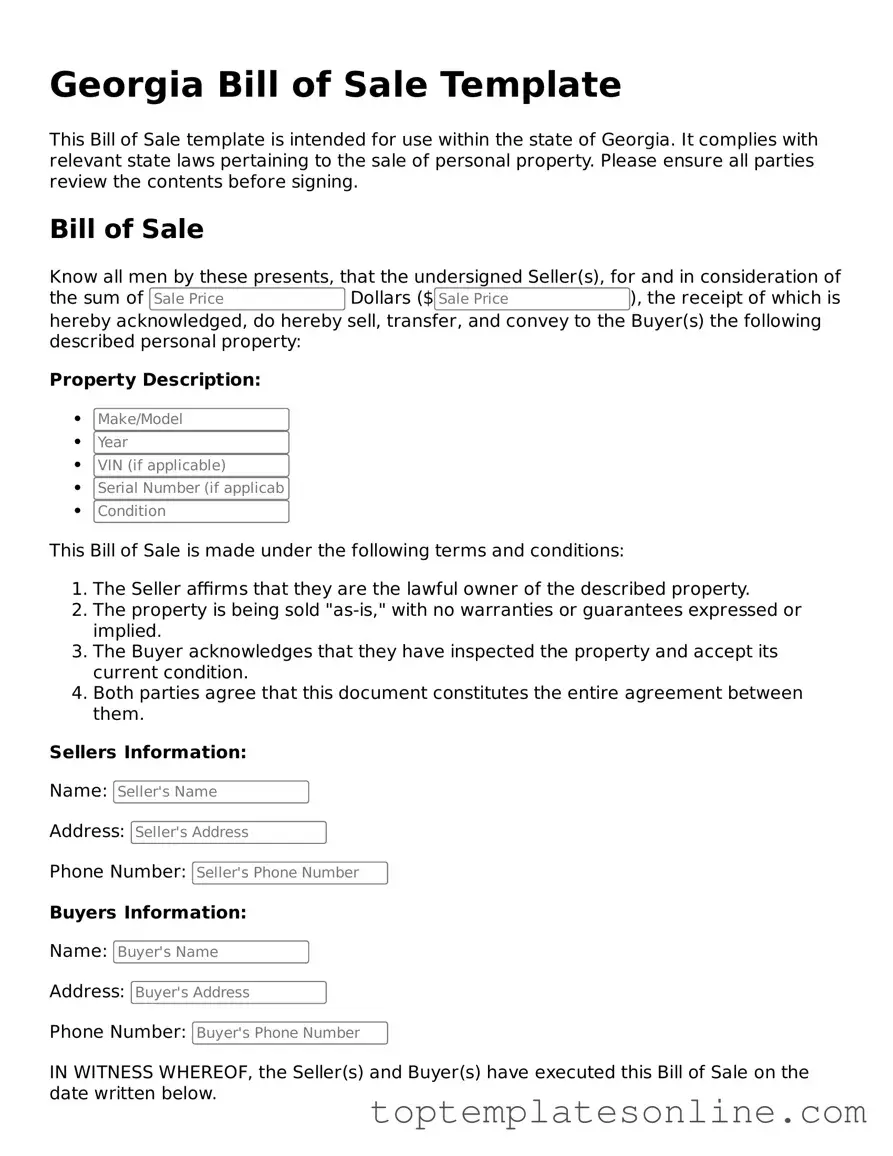Blank Bill of Sale Template for Georgia State
The Georgia Bill of Sale form serves as a crucial document in the transfer of ownership for various types of personal property, including vehicles, boats, and even certain types of goods. This form provides a clear record of the transaction, detailing essential information such as the names and addresses of both the buyer and the seller, a description of the item being sold, and the purchase price. Additionally, it may include any warranties or representations made by the seller regarding the condition of the item. By documenting the sale, this form protects the interests of both parties and helps prevent disputes in the future. In Georgia, while the Bill of Sale is not always legally required, it is highly recommended for significant transactions, especially those involving vehicles, as it aids in the registration process and serves as proof of ownership. Understanding the components and importance of the Georgia Bill of Sale form can empower individuals to engage in transactions with confidence and clarity.
Some Other State-specific Bill of Sale Templates
Motor Vehicle Bill of Sale - Many states require a Bill of Sale for certain types of purchases.
Texas Dmv Forms - It can be beneficial in establishing proof of asset ownership.
For individuals looking to understand the legal implications, our guide on the comprehensive Motor Vehicle Bill of Sale document can assist in ensuring a smooth transaction. You can find the template and additional resources here.
What Does Bill of Sale Look Like - When selling firearms, a Bill of Sale can help comply with state regulations.
Common mistakes
When completing the Georgia Bill of Sale form, individuals often make several common mistakes that can lead to complications down the line. Below is a list of four mistakes to avoid:
-
Incomplete Information: Failing to provide all required details can create issues. Ensure that both the seller's and buyer's names, addresses, and signatures are clearly filled out. Missing information may invalidate the document.
-
Incorrect Vehicle Identification Number (VIN): Double-check the VIN for accuracy. An incorrect VIN can lead to confusion regarding ownership and may complicate future transactions.
-
Not Including Sale Price: Omitting the sale price can lead to disputes later. Clearly state the amount agreed upon to ensure both parties have a record of the transaction.
-
Failure to Sign: Both parties must sign the form for it to be valid. A signature acts as a confirmation of the agreement. Without it, the Bill of Sale may not hold up in legal situations.
By being aware of these common pitfalls, individuals can ensure that their Bill of Sale is filled out correctly, providing clarity and protection for both the buyer and the seller.
Guide to Writing Georgia Bill of Sale
After gathering the necessary information, you will proceed to fill out the Georgia Bill of Sale form. This document requires specific details about the transaction, including information about the buyer, seller, and the item being sold. Following these steps will ensure that you complete the form accurately and efficiently.
- Begin by entering the date of the sale at the top of the form.
- Provide the full name and address of the seller in the designated fields.
- Next, fill in the buyer's full name and address.
- Describe the item being sold. Include details such as the make, model, year, and Vehicle Identification Number (VIN) if applicable.
- Indicate the purchase price of the item in the appropriate section.
- If applicable, note any warranties or guarantees associated with the sale.
- Both the seller and buyer should sign and date the form at the bottom.
- Make sure to keep a copy of the completed Bill of Sale for your records.
Documents used along the form
The Georgia Bill of Sale form serves as a crucial document for recording the transfer of ownership of personal property. When completing a transaction, several other forms and documents may be required to ensure a smooth process. Below is a list of common documents that are often used in conjunction with the Bill of Sale in Georgia.
- Title Transfer Document: This document officially transfers ownership of a vehicle or other titled property from the seller to the buyer. It must be completed and submitted to the appropriate state agency.
- California Dog Bill of Sale - This essential document is used to transfer ownership of a dog in California, ensuring both parties are safeguarded during the transaction. For more information, visit PDF Documents Hub.
- Odometer Disclosure Statement: Required for vehicle sales, this statement records the vehicle's mileage at the time of sale. It helps prevent fraud and ensures accurate vehicle history.
- Affidavit of Identity: This sworn statement verifies the identity of the parties involved in the transaction. It may be necessary if there are discrepancies in identification or ownership.
- Vehicle History Report: This report provides information about a vehicle's past, including accidents, title issues, and service history. Buyers often request this to make informed decisions.
- Sales Tax Form: This document is used to report and pay sales tax on the transaction. In Georgia, the buyer typically submits this form along with payment to the state.
Utilizing these documents alongside the Georgia Bill of Sale form can facilitate a clear and legal transfer of ownership. It is advisable to ensure that all necessary forms are completed accurately to avoid potential disputes or complications in the future.
